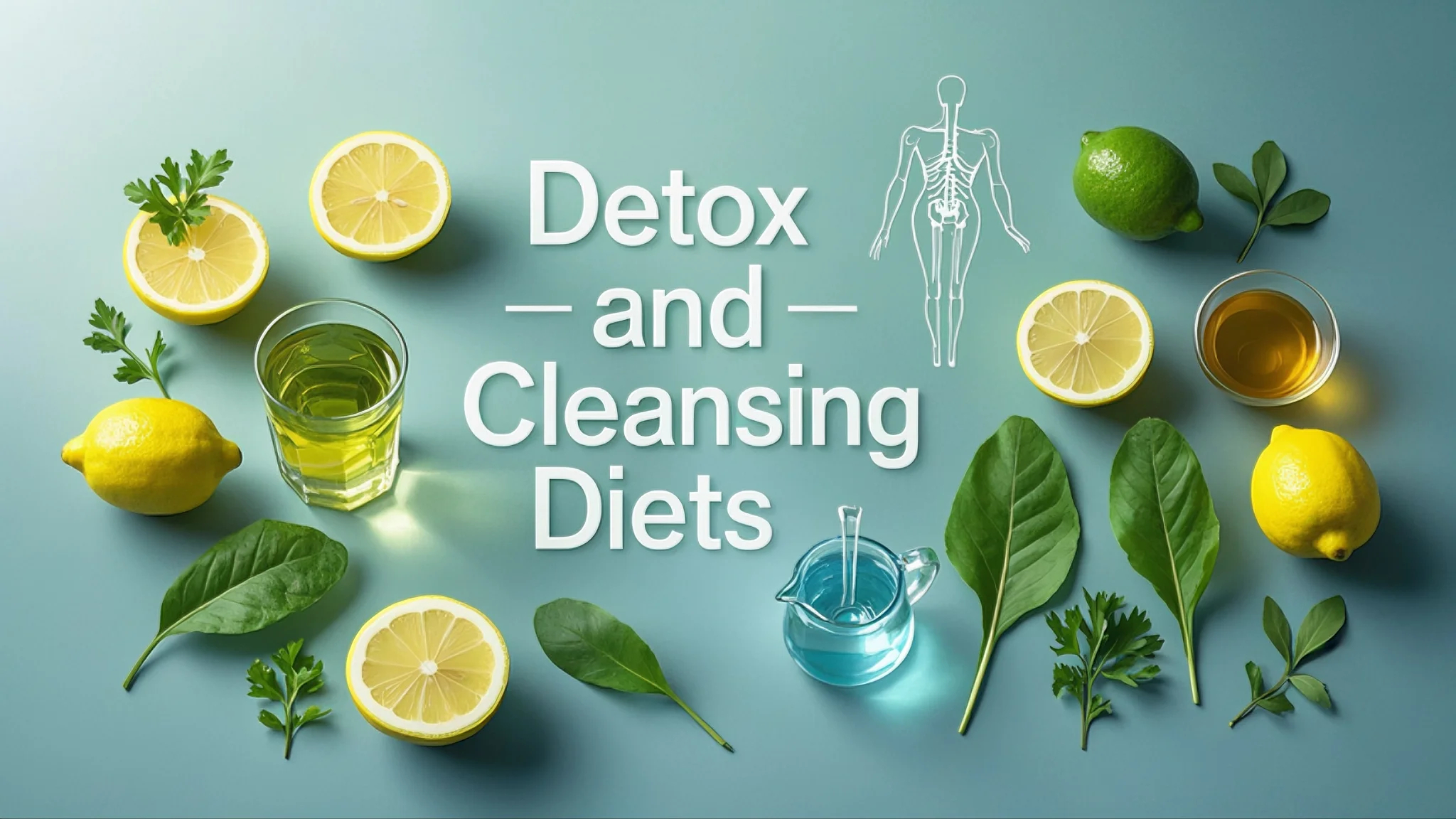Detox and Cleansing Diets
Did you know the global detox product market is worth a staggering $51 billion? From juice cleanses to herbal supplements, people are investing heavily in the promise of a healthier body. But here’s the kicker: your body might already be doing the work for you.
Detox diets have become a go-to solution for many, promising to flush out toxins and boost health. Yet, experts point out that organs like the liver and kidneys are natural detox powerhouses. Think of it as your body’s daily “spring cleaning.”
In this article, we’ll explore the science behind these diets, their potential benefits, and whether they’re worth the hype. Ready to separate fact from fiction? Let’s get started.
Understanding Detox and Cleansing Diets
Ever wondered why detox diets are so popular despite their mixed reviews? These plans often promise to remove toxins and boost your health, but what’s the real story? Let’s break it down.
Defining Detox and Cleansing Diets
Detox diets are short-term interventions that claim to cleanse your body of harmful substances. They typically involve:
- Restricting certain foods or food groups.
- Focusing on juice or liquid-based meals.
- Using supplements or herbs to aid the process.
These diets often highlight ingredients like fruits, vegetables, and vitamins, but their effectiveness is debated.

Common Misconceptions and Myths
Many people believe detox diets are essential for health, but here’s the truth:
- Your body already has a built-in detoxification system—your liver and kidneys.
- Claims about removing toxins often lack scientific evidence.
- Some detox plans, like fasting, can lead to low energy and nutrient deficiencies.
For most people, a balanced diet and staying hydrated are enough to support your body’s natural processes. Learn more about full-body detox and why it might not be necessary.
How Detox Diets Claim to Eliminate Toxins
Detox diets promise a lot, but do they deliver? These plans often claim to flush out toxins, boost energy, and improve overall health. But how do they actually work, and are these claims backed by science? Let’s break it down.
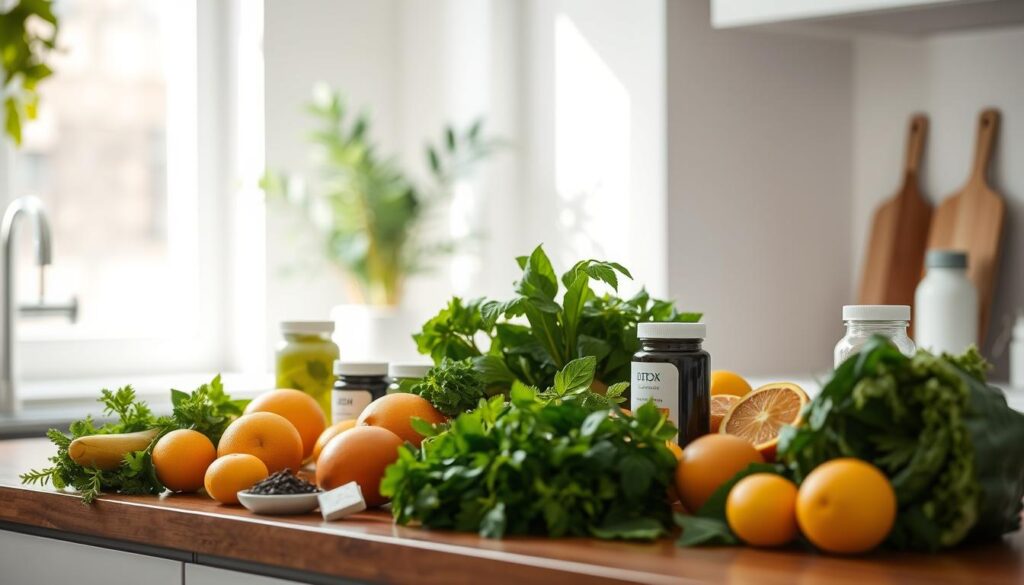
Fasting and Juice-Only Approaches
One popular method is fasting or sticking to juice-only regimens. These plans suggest that giving your body a break from solid food helps it “reset” and remove toxins. For example, a 3-day juice cleanse might sound refreshing, but studies show that any weight loss is often temporary. Participants in one study regained half the lost weight within two weeks.
While these methods might feel like a quick fix, they can lead to low energy and nutrient deficiencies. Your liver and kidneys are already experts at detoxifying—no juice required.
Herbal Supplements and Colon Cleanses
Another approach involves herbal supplements and colon cleanses. These products claim to enhance your body’s natural detoxification system. However, research shows that many supplements contain laxatives, which can be misleading. Colon cleanses, often marketed as a way to remove “toxic buildup,” lack scientific evidence to support their effectiveness.
In fact, a 2015 review found no solid proof that commercial detox diets work. So, while these methods might feel like a “diet dare,” they’re not the miracle cure they’re made out to be.
For a deeper dive into the science behind detox diets, check out this comprehensive guide.
Methods and Variations in Detox Diets
From raw food plans to liquid cleanses, detox diets offer a variety of methods. Each approach claims to support your body and improve health, but they vary widely in their rules and results. Let’s explore the most common methods and what they involve.
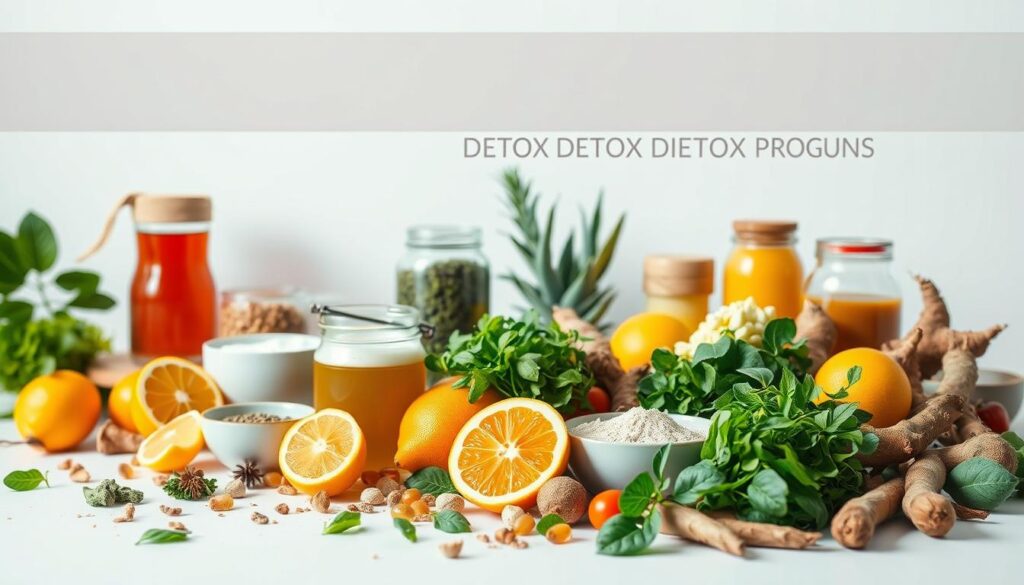
Restricted Diet Plans and Raw Food Options
Some detox diets focus on cutting out specific foods or food groups. For example, plans might eliminate processed sugar, dairy, or gluten. Others emphasize raw, whole foods like fruits, vegetables, and nuts. These diets aim to reduce the intake of harmful substances and promote natural detoxification.
While these methods can feel refreshing, they may also lead to nutrient deficiencies if not balanced properly. It’s essential to ensure your body gets all the vitamins and minerals it needs.
Liquid Cleanses and Supplement Use
Liquid cleanses, like the Master Cleanse, involve drinking only juices, teas, or water for a set period. These plans claim to give your digestive system a break and flush out toxins. However, they can leave you feeling low on energy and may not provide enough nutrients.
Supplements are another popular tool in detox diets. Products like green tea extracts or herbal blends promise to enhance your body’s natural cleansing process. Yet, many lack scientific evidence to back their claims.
Not every method works for everyone. Some people thrive on raw food plans, while others find liquid cleanses too restrictive. The key is to choose a plan that supports your health without compromising your well-being.
Natural Detoxification: How Your Body Clears Toxins
Your body is a natural detox machine, working tirelessly to keep you healthy. Every day, your organs process and remove harmful substances without the need for extreme diets or supplements. Let’s take a closer look at how this works.

The Role of the Liver and Kidneys
Your liver is like a chemical processing plant. It breaks down toxins, such as alcohol and heavy metals, into less harmful substances. These are then flushed out through your digestive system or kidneys. Without your liver, even small amounts of harmful substances could cause serious damage.
Your kidneys are the body’s filtration system. They filter waste and toxins from your blood, sending them out through urine. Staying hydrated is key to keeping your kidneys functioning at their best. Drinking enough water helps them flush out toxins efficiently.
These organs work together to keep your body clean and healthy. Supporting them with a balanced diet rich in fruits, vegetables, and essential nutrients is crucial. Foods high in vitamins and minerals, like leafy greens and berries, can enhance their natural detoxification processes.
Your body’s detox system is always active, whether you’re eating, sleeping, or exercising. Sweat, digestion, and even breathing play a role in removing toxins. By focusing on healthy habits, you can help your organs do their job effectively.
Analyzing the Benefits and Risks of Detox Diets
Detox diets often spark debates—are they a health boost or a risky trend? Some swear by their ability to reset the body, while others warn of potential downsides. Let’s break it down to see if these plans are worth your time.
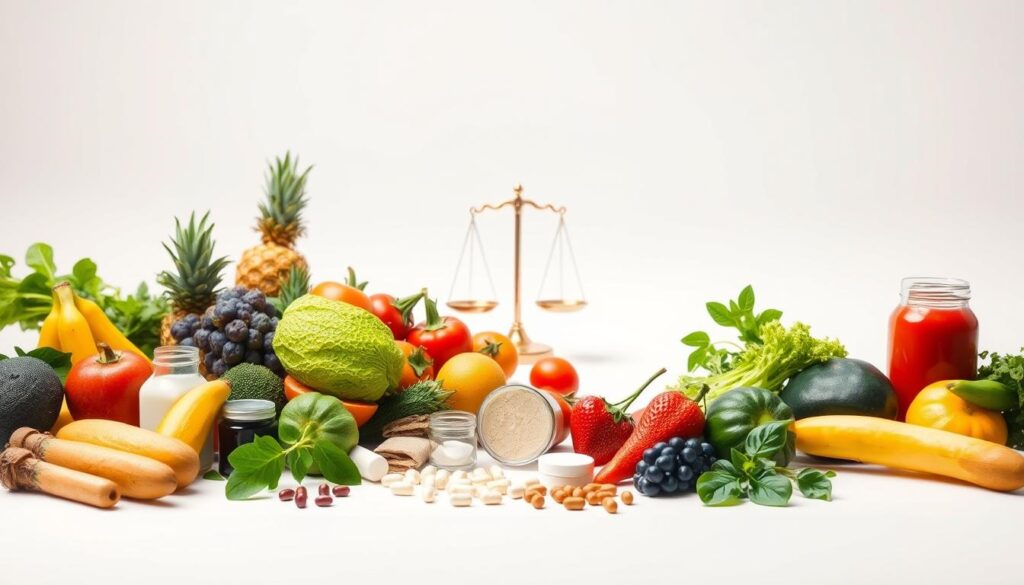
Potential Health Benefits and Energy Boosts
Many people report feeling lighter and more focused after a detox. Some plans, like those involving green tea or juice, claim to boost energy levels. A 2021 study even suggested that certain detox protocols can reduce exposure to harmful substances.
Short-term benefits may include improved digestion and a sense of accomplishment. For example, cutting out processed food can make you feel less sluggish. However, these effects are often temporary and vary from person to person.
Risks, Side Effects, and Nutritional Deficiencies
While detox diets may sound appealing, they come with risks. Severe calorie restriction can lead to fatigue and nutrient imbalances. A 2022 review found that some plans raise cortisol levels, increasing stress and appetite.
Dehydration is another concern, especially with fasting or juice-only regimens. Without proper hydration, your body’s natural detoxification process can slow down. In extreme cases, this may lead to kidney issues or electrolyte imbalances.
It’s also worth noting that many detox products contain laxatives, which can cause severe side effects. Instead of relying on quick fixes, focus on a balanced diet rich in whole foods. This approach supports your health without the risks.
Before starting any detox plan, weigh the potential benefits against the risks. Consulting a healthcare professional can help you make an informed decision.
Optimizing Your Diet: Foods and Supplements for Detox
What if the key to better health is already in your kitchen? Your diet plays a huge role in supporting your body’s natural detoxification process. By choosing the right foods and supplements, you can boost your health without extreme measures. Let’s explore how to make your meals work for you.
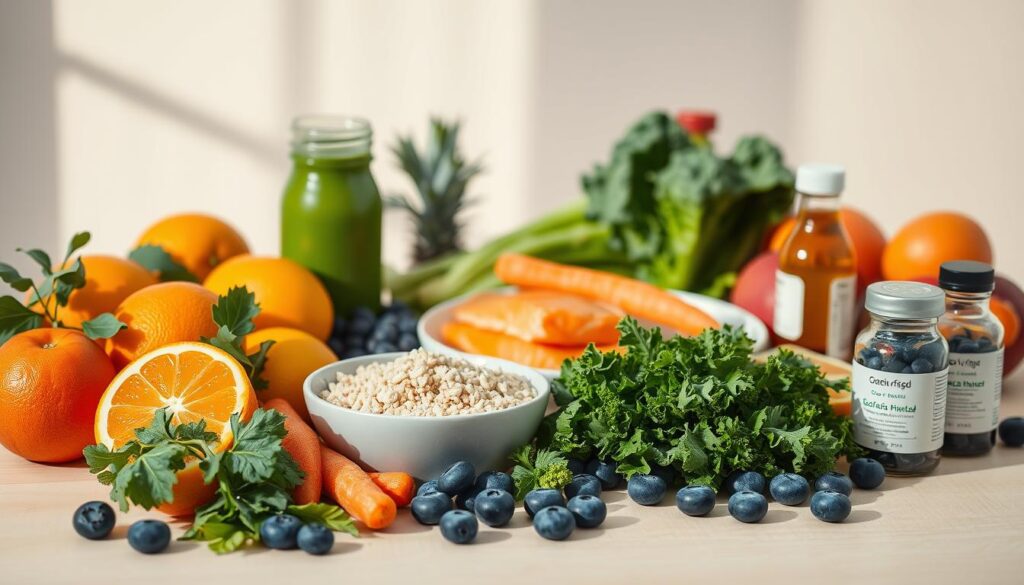
Choosing Nutrient-Rich Fruits and Vegetables
Start by loading up on fruits and vegetables. These are packed with antioxidants that help your liver and kidneys function at their best. For example, leafy greens like spinach and kale are rich in chlorophyll, which supports detoxification. Berries, such as blueberries and strawberries, are loaded with vitamins that fight oxidative stress.
Don’t forget sulfur-rich foods like garlic and onions. They enhance the production of glutathione, a key antioxidant in your body. Adding these to your meals can make a noticeable difference in how you feel.
Foods and Ingredients to Avoid
While some foods help, others can hinder your health. Processed snacks and sugary drinks are major culprits. They add unnecessary toxins to your system and can slow down your digestive system. Cutting back on refined sugar and artificial additives is a smart move.
Be cautious with supplements too. Not all products are backed by research. Stick to options like green tea or activated charcoal, which have evidence supporting their benefits. Always consult a professional before adding new supplements to your routine.
Planning meals in advance can help you stay on track. Focus on whole, unprocessed foods and drink plenty of water. These small changes can have a big impact on your overall well-being.
Lifestyle Strategies to Support Your Detox Process
Want to boost your health without extreme measures? Let’s talk lifestyle tweaks. Your body is already a detox pro—here’s how to help it work even better.
Start with hydration. Drinking enough water keeps your kidneys and liver in top shape. A good rule of thumb? Aim for half your body weight in ounces daily. Add a slice of lemon for a refreshing twist.
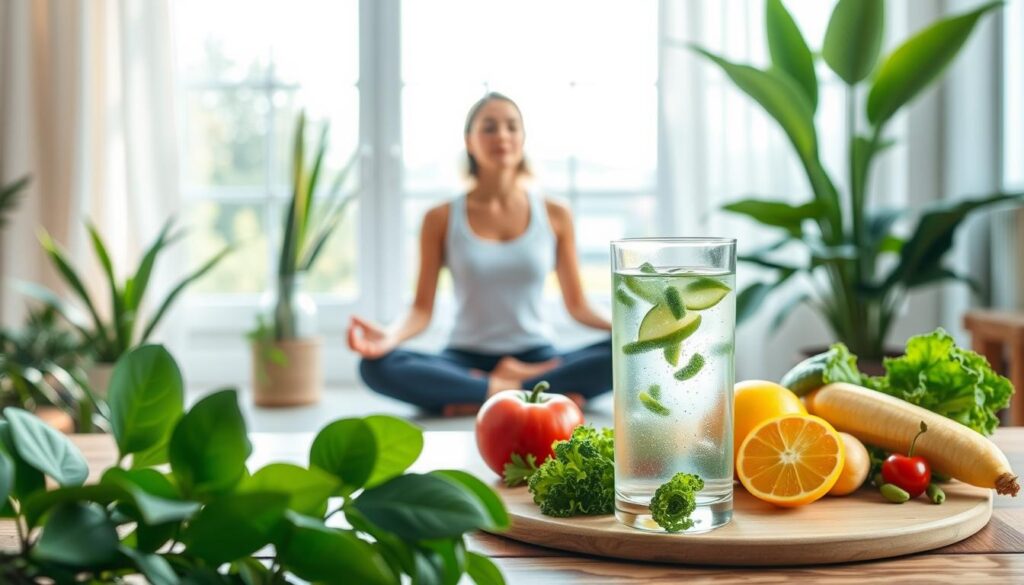
Sleep is another game-changer. Quality rest helps your body clear waste more efficiently. Try a tech-free bedtime routine—your brain will thank you. Bonus: It’s a great excuse to unplug.
Exercise doesn’t have to be intense. A daily walk or yoga session can boost circulation and detoxification. Plus, it’s a stress-buster. Win-win.
Speaking of stress, managing it is key. Deep breathing or meditation can work wonders. Even a cup of green tea can help you unwind while supporting your health.
Lastly, watch your diet. Cutting back on salt and sugar can make a big difference. Focus on whole, unprocessed foods—your body will feel the benefits.
Small changes, big results. Supporting your body’s natural processes doesn’t have to be complicated. Start today and feel the difference.
Detox and Cleansing Diets: Approaches Tailored to Your Needs
Your detox journey should be as unique as your fingerprint. What works for one person might not work for another. That’s why personalizing your plan is key to success. Let’s explore how to create a detox approach that fits your body and lifestyle.
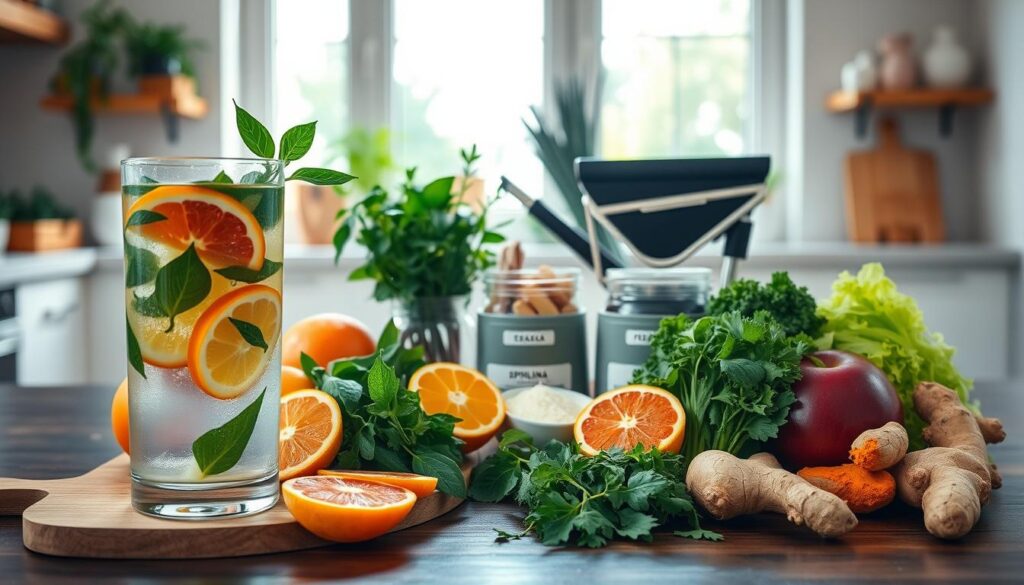
Personalizing Your Detox Plan
There’s no one-size-fits-all solution when it comes to detox. Your age, medical history, and daily habits all play a role. For example, someone with a busy schedule might focus on simple changes like swapping processed food for whole options. Others might benefit from a structured plan with specific goals.
Consider your current diet and health status. Are there areas you’d like to improve? Maybe you want to boost energy or support your body’s natural detoxification process. Small, realistic changes often lead to lasting results.
Consulting Health Professionals for Guidance
Before starting any detox plan, it’s smart to consult a professional. A healthcare provider can help you avoid risks and tailor a plan to your needs. For instance, certain detox methods might not be safe if you have underlying conditions or take medications.
Recording your progress can also help. Track how you feel, what you eat, and any changes in your health. This data can guide adjustments and ensure your plan stays effective. Remember, the goal is to support your body, not overwhelm it.
For more insights on detox safety and effectiveness, check out this research study.
Wrapping Up Your Detox Journey
Let’s wrap up your detox journey with clarity and confidence. Your body is already a pro at removing toxins—your liver and kidneys handle it daily. While detox plans promise quick fixes, a balanced diet and healthy habits are the real game-changers.
Focus on whole foods like fruits, veggies, and lean proteins. These support your health without extreme measures. Remember, your body’s natural detoxification system doesn’t need a juice cleanse to feel appreciated.
Here’s a tip: blend good nutrition with lifestyle tweaks. Stay hydrated, move daily, and manage stress. Small changes lead to big results. So, what’s your next step? Reflect on what works best for you and take it one day at a time.
